
-
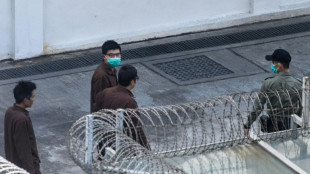 Hong Kong charges jailed activist for 'collusion with foreign forces'
Hong Kong charges jailed activist for 'collusion with foreign forces'
-
Germany faces two more years of recession if US trade war escalates: central bank

-
 India's Modi opens strategic railway in contested 'crown jewel' Kashmir
India's Modi opens strategic railway in contested 'crown jewel' Kashmir
-
Crusaders thump Reds to book Super Rugby semifinal spot

-
 Russia pummels Kyiv in deadly attack after Putin retaliation vow
Russia pummels Kyiv in deadly attack after Putin retaliation vow
-
Uzbekistan coach says historic World Cup spot for 'our entire people'

-
 Canada, US, Mexico brace for World Cup extravaganza
Canada, US, Mexico brace for World Cup extravaganza
-
Amazon agrees to tackle fake reviews in UK: regulator

-
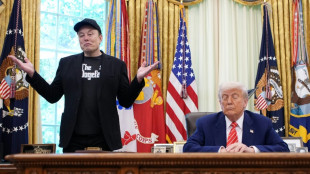 Markets wobble as Trump-Xi talks offset by Musk row
Markets wobble as Trump-Xi talks offset by Musk row
-
Venezuelan family feels full force of Trump's crackdown
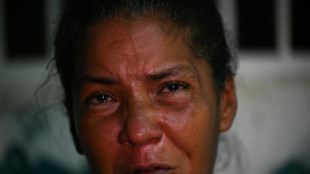
-
 India's Modi arrives in Kashmir to open strategic railway
India's Modi arrives in Kashmir to open strategic railway
-
Bacteria cancels water shows at Japan's World Expo
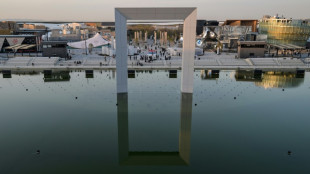
-
 New Europe push to curb children's social media use
New Europe push to curb children's social media use
-
Muslim pilgrims 'stone the devil' as hajj nears end in Saudi Arabia
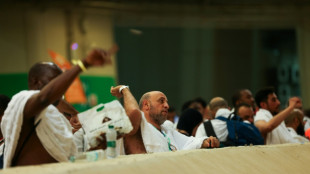
-
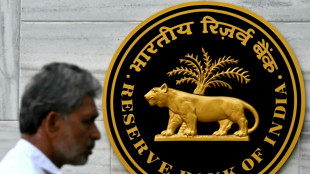 India's central bank cuts rates more than expected to boost growth
India's central bank cuts rates more than expected to boost growth
-
Vietnam exports up as US tariff threat lingers

-
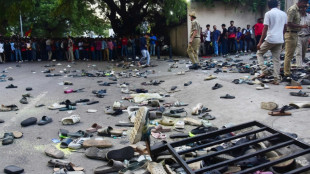 Indian police arrest two after deadly cricket stampede: reports
Indian police arrest two after deadly cricket stampede: reports
-
China fans savage team again after latest World Cup flop

-
 Studio Ghibli marks 40 years, but future looks uncertain
Studio Ghibli marks 40 years, but future looks uncertain
-
SGA says Thunder have what it takes to rebound from game one heartbreaker

-
 South Korea turn focus to 2026 after sealing World Cup spot
South Korea turn focus to 2026 after sealing World Cup spot
-
Taliban hang up Kalashnikovs to pen memoirs of Afghan war

-
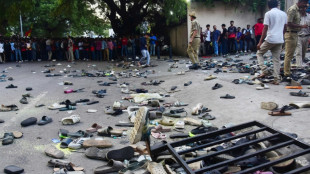 India police arrest two after deadly cricket stampede: reports
India police arrest two after deadly cricket stampede: reports
-
Japanese company aborts Moon mission after assumed crash-landing

-
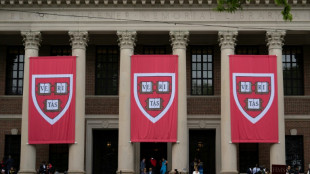 Court blocks Trump's new ban on foreign students at Harvard
Court blocks Trump's new ban on foreign students at Harvard
-
Haliburton's last-second shot lifts Pacers over Thunder in NBA Finals

-
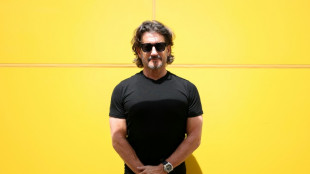 'No doubt' Canadian firm will be first to extract deep sea minerals: CEO
'No doubt' Canadian firm will be first to extract deep sea minerals: CEO
-
'Backs to the Wall' for surfing's cancer survivor Flores

-
 Stade Francais eye Top 14 survival after 'rubbish' season
Stade Francais eye Top 14 survival after 'rubbish' season
-
Midak bids to deliver poignant victory in 'Aga Khan's' Derby

-
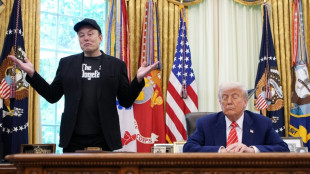 Asian markets wobble as Trump-Xi talks offset by Musk row
Asian markets wobble as Trump-Xi talks offset by Musk row
-
Trump trade, immigration policies clouding World Cup preparations

-
 School's out: climate change keeps Pakistan students home
School's out: climate change keeps Pakistan students home
-
Four-time NFL MVP Rodgers agrees Steelers deal: club

-
 Australia struggle to fill gaping opener hole left by Warner
Australia struggle to fill gaping opener hole left by Warner
-
Brazil held in Ancelotti debut, Paraguay move closer to qualifying

-
 NBA 'should explore' league expansion: Silver
NBA 'should explore' league expansion: Silver
-
AI-generated Pope sermons flood YouTube, TikTok

-
 Renowned Mars expert says Trump-Musk axis risks dooming mission
Renowned Mars expert says Trump-Musk axis risks dooming mission
-
Muslim pilgrims 'stone the devil' as hajj concludes in Saudi
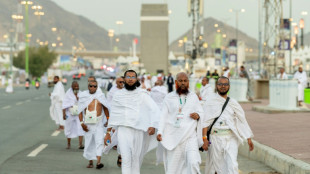
-
 The promise and peril of a crewed Mars mission
The promise and peril of a crewed Mars mission
-
Hugh Jackman, Ryan Reynolds become co-owners of Australia SailGP team

-
 Walsh swims second-fastest 100m butterfly in history at US Championships
Walsh swims second-fastest 100m butterfly in history at US Championships
-
Trump and Musk alliance melts down in blazing public row

-
 Hundreds evacuated as Guatemalan volcano erupts
Hundreds evacuated as Guatemalan volcano erupts
-
Norway adopts tourist tax to combat overtourism

-
 Dehorning of S.African rhinos slashed poaching: study
Dehorning of S.African rhinos slashed poaching: study
-
Executive bonuses banned at six UK water companies over pollution

-
 Angle PLC Announces Board Changes
Angle PLC Announces Board Changes
-
Formation Metals Retains StratExplo to Manage 20,000 Metre Multi-Phase Drill Program for the Advanced N2 Gold Project


Does Brazilian funk glorify crime? Singer's arrest triggers debate
The arrest of a popular funk singer in Brazil on suspicion of glorifying a powerful crime gang has revived a long-standing debate over the criminalization of a genre born in Rio de Janeiro's gritty favelas, or slums.
Unlike its US namesake, which was popularized by James Brown, Rio funk borrows more from hip-hop, blended with samba and other Brazilian rhythms.
The lyrics, seen by many as celebrating favela drug lords, have repeatedly led to calls for songs to be censored.
Last week, MC Poze do Rodo, one of the genre's best-known artists with 16 million followers on Instagram, was arrested on charges of glorifying crime and having links to Comando Vermelho (CV), one of Brazil's biggest gangs.
The authorities said his arrest aimed to send a message to those "who romanticize and help spread narcoculture."
The police argue that Poze's music "clearly condones" drug trafficking and illegal use of firearms and point to concerts held "exclusively in areas dominated by CV, with a notable presence of traffickers armed with high-caliber weapons."
After five days in preventive custody, the 26-year-old singer was released on Tuesday to a rapturous welcome from waiting fans, who swarmed his car in a column of motorbikes.
Police fired tear gas and stun grenades to disperse the crowds.
Speaking afterwards, the singer claimed he was the victim of police discrimination.
"Rio de Janeiro police don't like me... because I'm black? Because I'm from a favela?"
- 'Singers are not criminals' -
Marlon Brendon Coelho Couto was born in the favela of Rodo, one of the biggest in western Rio.
He has admitted to selling drugs in his youth but says that he abandoned crime to devote himself to music.
Police footage of his arrest at his current home in the upmarket Recreio dos Bandeirantes district, cuffed and shirtless, surrounded by heavily armed officers, caused an outcry among his fans.
Fellow musicians took part in a campaign for his release, organized by his wife, influencer Viviane Noronha, on the grounds that "funk singers are not criminals."
Erika Hilton, a Congress member, argued that by arresting Poze the authorities were seeking to "project all the sins of the world onto black people."
But many rejoiced at seeing the star behind bars, including former far-right president Jair Bolsonaro, an ex-army captain, who posted a picture of the singer with a clown emoji on his Instagram account.
- Arresting the messenger -
Funk describes the reality of life in Rio's crime-blighted favelas.
Poze's lyrics have regularly caused controversy.
In his 2023 track "Homenagem Pra Tropa do Rodo," he pays tribute to men killed "shooting for Comando Vermelho."
The debate surrounding funk's role in crime mirrors long-standing discussions in the United States over the links between rap and violence in Black communities.
Over a decade ago, authorities in the northeastern Brazilian city of Fortaleza passed a law banning venues from hiring artists that incite violence.
Similar anti-Oruam bills, as they are known after the rapper son of a famous drug lord, are now also being debated by several other cities and state parliaments.
Danilo Cymrot, a doctor in criminology at the University of Sao Paulo, pointed to a "gray area" in the definition of glorification of violence, relating to artistic content.
"The artist doesn't necessarily agree with his lyrics," Cymrot, author of a book about Rio funk, said.
He added that "oftentimes, the police and the judiciary have a hard time understanding funk as a work of art."
As a result, he said, the artist's origins are often used to determine whether he condones violence.
"It's less the message itself and more who is singing it."
P.Costa--AMWN